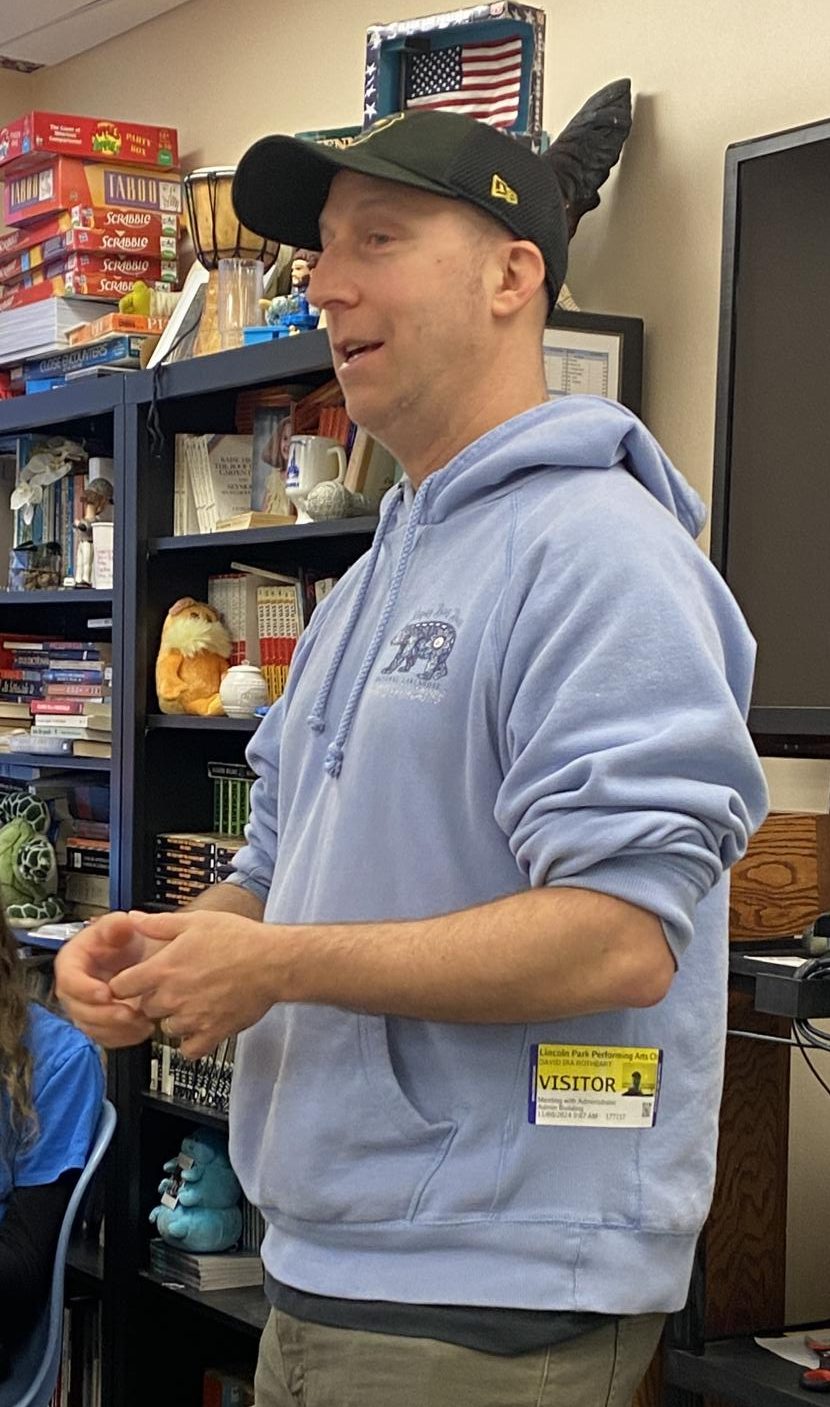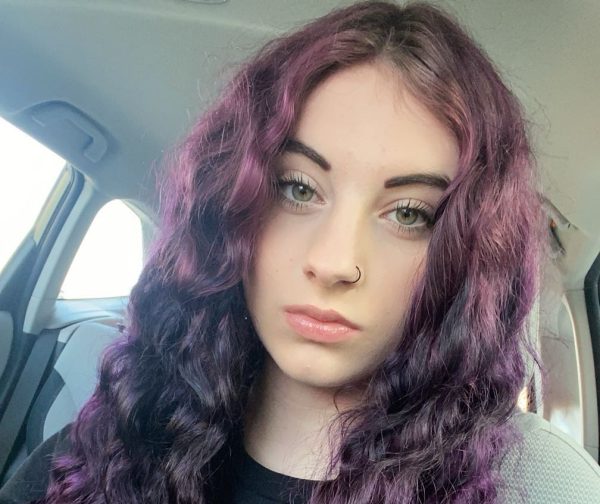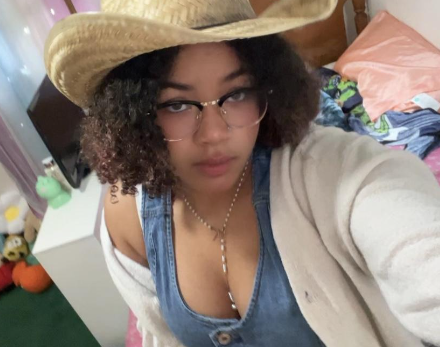Davy Rothbart is a best-selling American author and filmmaker. His film, 17 Blocks, is what he’s most known for in the film industry. He has created and published a collection of essays titled My Heart is an Idiot and several other books. In addition to that, he’s the creator of Found Magazine, a collection of magazines displaying various written pieces, whether it be notes, stories, or doodles on napkins. People who have discovered writings send them in from all over the world.
The SIREN was given an opportunity to interview Rothbart when he came to Lincoln Park for the showing of his film 17 Blocks. We were able to ask questions about his works. For those who don’t know, 17 Blocks is a documentary of a struggling family living 17 blocks away from the Capitol Building in D.C. It’s inspiring and gut-wrenching, and shows the family’s ups and downs, all the while dealing with drug addiction and gun violence.
What made you want to start writing? Did you grow into it yourself or did someone inspire you?
I think probably [it] was born out of love for reading books. I love reading books. And then, I had a teacher in third, maybe fourth grade, named Doris Sperling. And, in class, she had us write our own books. I know it’s like a young age to write your own book, but I mean, it was probably like eight pages long and it was like, each page might have had a sentence or two on it, you know, and we could actually illustrate them too. But, I remember me and my friend, we wrote this series of books about a tarantula and an underwater robot that were, like, best friends. And, it was so fun.
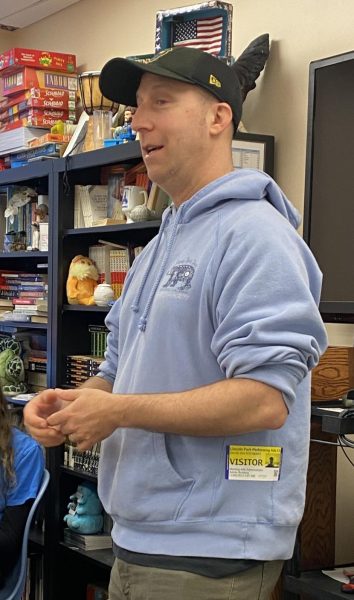
It was just getting to make up stories basically, and write it down and even like the illustration part of it. And, yeah. Yeah. I just, you know, so I wrote all kinds of stories over junior high, high school. But later, I started writing personal stories, like, stories that were actually real true about my own life.
And I found that that was a great way to just kind of share my own experiences with, with friends and then even eventually strangers once I started publishing books and everything.
Did Emanuel and Smurf Stanford inspire the film 17 Blocks or did you have that idea before them?
Yeah. Initially, our idea, my idea, was to make a short film starring Emanuel and Smurf and, like, a fictional film, like a story that I had made up, and they were just gonna be the actors in the movie.
We started filming that. It wasn’t going very well. Emanuel was only nine. He was a really funny, boisterous, smart, sweet kid. But, he was kinda shy when I would, like, ask him to try to coax him through these– acting through these scenes with strangers on the street and, like, it was just it was a little awkward.
It just– it wasn’t really working, but I got, at that point, really interested in his and his family’s actual life. Because the more time I spent with them, I was like, oh, there’s a lot happening here. You know? And so we kinda shifted our focus. I don’t know that we ever were, like, alright.
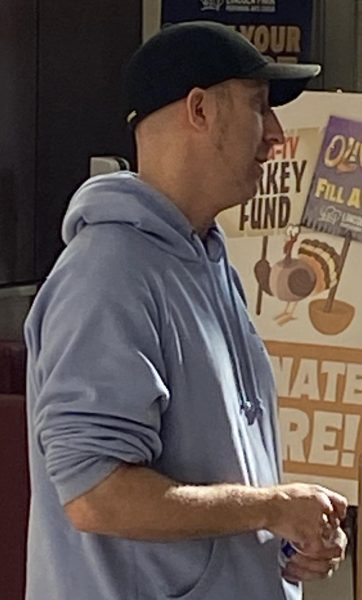
That movie’s done. Like, even for weeks and maybe months later, we still, every once in a while, would try to film a scene for that short film that never turned into anything. But, what we sort of lean[ed] more into, was just filming what was actually happening in their home and on their block and in their community. And of course, part of that was not just me filming, but sharing the camera with them. They were interested in using the camera, learning how to use it, Emanuel, especially at age nine. So, yeah, I would leave the camera there overnight on weekends.
And it really became this collaborative project of, like, documenting their daily life in a neighborhood that’s known as one of the roughest neighborhoods in D.C., and maybe even the country. And of course, the irony being that it’s just 17 blocks from the U.S. Capitol building. So you can look down the street and see Capitol dome and yet here, you know, it’s really rough things happening. So, and yeah. And then just, you know, we just kept doing it for years.
And after 20 years, we decided, alright. Let’s stop filming and let’s start editing all these photos together. That’s how we made our film 17 Blocks.
Where did your idea for creating Found magazine come from? What was it inspired by?
So, I found a note. I was living in Chicago after college and I found a note on my windshield.
My name is Davy, but this note was addressed to Mario. So I picked up, you know, my windshield. I was like, what is this? I opened it up. It said, “Mario, I effing hate you. You said you had to work. Why is your car here at her place? You’re a liar. I hate you. I effing hate you.”
Signed Amber. It said “P.S., page me later.” And I just thought it was fun that she’s so angry and upset with this guy, but still, it’s kind of hopeful and sweet, like, in love. Maybe “P.S., page me later.”
And of course it wasn’t even Mario’s car, it was my car, you know? So I kept wondering like, what was the story here? How does she get confused about which car was whose? And, but I started showing that note to my friends and then they started showing me stuff they had found. Maybe it was a to-do list, a journal entry.
People were finding stuff all around their neighborhoods, and then really all across the country and started sending them to me. And so it was just a little DIY homemade zine that I’ve just used Scotch tape and scissors to, like, piece the first issue together. But, it really was resonating with people. I think the notes were funny, insightful. It kind of gives you a glimpse into other people’s lives.
And, I think there’s a magic to that. You know, we relate to these notes. We’re laughing at ourselves when we read these notes. And so yeah, it just kind of grew from there to something way beyond whatever [I] expected when I started it.
You wrote a book titled My Heart is an Idiot and from the description it says you wear your heart on your sleeve. How does that affect your writing?
I mean, so my heart is an idiot. It’s a lot of stories, from the road adventures I’ve had, traveling around the country with my brother. We’ve driven [to] all 50 states, sharing fountain magazines, doing events and had some interesting adventures along the way. And then, a lot of the stories are about my own misadventures and love and relationships. And, I think that heartlessly that that copy was probably written by, like, a marketing person for the publisher.
But I think it does touch on something key, which is, you know, like I try when I’m writing these personal stories, personal essays, I try to be really vulnerable. I try to really be honest. I try to maybe paint myself not always in the best. It’s not an infomercial for me. It’s more like this is, these are some of the idiotic mistakes I’ve made and how things went sometimes hilariously awry, you know?
So, and also just to be open with the emotions that I might’ve been feeling in these moments. So like my editor, [a] brilliant editor, named Sean McDonald, but he would actually tease me and dog me for like, he was like, you’re crying in every one of these essays. Cause I was writing about how emotional I was in this experience. I said my eyes were wet. I was crying.
He was like, he was like too much, too much tears, too much, too much emotion. So we pulled it back a little bit, but still I think in the essays, I’m really wearing my heart on my sleeve. I’m really being vulnerable, honest, [and] emotional. And, I think that actually resonates with people. I think I know when I read books, I like to hear about what’s, you know, especially if it’s nonfiction or personal storytelling.
I like to hear people being honest about what they were going through at the time. And so that’s what I’ve tried to channel in the book.
It seems like basketball was something meaningful to you growing up. Did it influence you to create Medora?
Yeah. So, basketball, I mean, I love the sport. I love playing. I love the exercise, the physical physicality, but it’s also a great way to meet people, you know, and it’s a great way. It’s like, I can land in any… I play less than I used to, but I can still land in any town, find a pickup game, and jump in it, and then just kinda connect with people and make friends, or at least, you know, get to know some new folks.
So I like that aspect of playing basketball. And being such a, my high school where I went to didn’t have a basketball team. It was kind of an arts high school. It was a public high school in Ann Arbor, Michigan, but it was, I’d say it had, like, a Lincoln Park vibe to it, you know? And so we didn’t even have a basketball team.
But when I was in college, I started a basketball team at my old high school, and I coached it not even knowing that much about really the fundamentals of the sport, but it was– I learned a lot. And then, I read this article in The New York Times about this high school basketball team in rural Indiana, [an] impoverished town, where it was known locally as, like, a meth town. And the basketball team there hadn’t won a game in years. And, but it was close enough to my hometown that I drove down there with my friend, and we met some of the players.
One was living homeless and, like, out of his car. Another was 17. He had a three-year-old daughter, you know. And they were really nice kids and the coaches were cool. And, we said that this would be great to be a documentary film.
So we got permission and we ended up coming back, with a few friends, a couple of cameras that we spent a year in the community really connecting with these kids. They share their stories in really brave and beautiful ways. And we were able to piece together this full length documentary film that it’s kind of exciting as a basketball film. It’s like, but it’s only nominally a sports movie. It’s really– sports is like an excuse to embed ourselves in the community and get to know the kids and their families.
So but it started with a love for basketball. And, in fact, Andrew, who was my co-director, his name is Andrew Cohn. We met on a basketball court when we were kids. So I probably wouldn’t have, he’s still one of my best friends to this day, and I don’t think I would have known him if it wasn’t for basketball.
Do you have a favorite tech, like, method of storytelling, whether that be film, books, etc.?
Yeah. I mean, I love– we haven’t talked much about radio storytelling, but I really love the power of the human voice. It’s a surprisingly intimate medium.
Like, when someone’s telling you a story, whether it’s, like, This American Life or just a podcast, you really like you, you feel like just hearing their voice in your ear, it’s you, it’s a surprisingly visual storytelling medium too. Even though you’re not seeing it when someone’s describing something, or you’re hearing the sound of something, you are creating those pictures in your own head. So it’s kinda, like, interactive in that way. So I love radio storytelling. That’s one of my favorite mediums.
But I love writing. I love filmmaking. One nice thing about writing is the bar, the barrier to entry is none, really. If you have a pen and a paper, you can write a story. If you have a laptop, you can sit there and write a book.
Filmmaking, what is frustrating sometimes is that even the bare bones DIY filmmaking that I like to do, you still need a camera. You need some mics. You need some crew, and it’s just a little more. It’s wonderful to collaborate, but it’s also, you might need a little more resources. Whereas writing, it’s you in a computer, you know, typewriter, and that’s all you need.
For more information about Found Magazine, click here, and follow Davy Rothbart on Instagram: @davyrothbart
